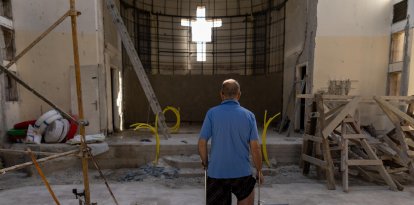The genocide of 'The Sunday People': 365,000,000 christians persecuted worldwide
One in seven Christians around the world (14%) is persecuted. In Asia it is as much as two in five—meaning 40% of all Christians there are persecuted.

(Open Doors)
In 2023, around the world, 4,998 Christians — on average, 13 a day — were "killed for faith related reasons." Another 4,125 Christians were illegally detained or arrested, and 14,766 churches and other Christian institutions were attacked.
Overall, the global persecution of Christians remains higher than ever, with 365 million believers suffering "high levels of persecution and discrimination for their faith."
These are among the findings of the World Watch List 2024 (WWL), recently published by the international humanitarian organization, Open Doors. Each year, the WWL ranks the top 50 nations where Christians are most persecuted for their faith, using data compiled from approximately 4,000 grassroots workers and external experts analyzing the persecution worldwide. The WWL 2024 report covers the time period between October 1, 2022 and September 30, 2023.
It finds that one in seven Christians around the world (14%) is persecuted. In Africa, that number grows to one in five (20%), while in Asia it is as much as two in five—meaning 40% of all Christians there are persecuted.
"Extreme levels of persecution"
Christians suffer "extreme levels of persecution" in the top 13 of the 50 nations. They are: 1) North Korea, 2) Somalia, 3) Libya, 4) Eritrea, 5) Yemen, 6) Nigeria, 7) Pakistan, 8) Sudan, 9) Iran, 10) Afghanistan, 11) India, 12) Syria, 13) and Saudi Arabia.
The form of persecution experienced in these 13 worst offenders ranges from being assaulted, raped, imprisoned or murdered on being identified as a Christian or attending (usually underground) churches.
Coming in at #1 is North Korea:
"Being discovered to be a Christian in North Korea is effectively a death sentence. Either believers will be deported to labour camps as political criminals, where they face a life of hard labor which few survive, or they are killed on the spot. The same fate awaits family members. There are believed to be tens of thousands of Christians held in labor camps across the country."
Most of the "extreme persecution" meted out to Christians in 11 of these worst 13 nations continues to come either from Islamic oppression, or takes place in Muslim-majority nations. Significantly, this means that approximately 84% of the absolute worst persecution around the globe takes place in the name of Islam.
This trend affects the entire list: the persecution that Christians experience in 37 of the 50 nations (or 74%) also comes either from Islamic oppression or occurs in Muslim-majority nations. The overwhelming majority of these nations are governed by some form of shari'a (Islamic law). It can either be directly enforced by government or society or, more frequently, both, although societies — particularly family members outraged by relatives who have converted — tend to be more zealous in its application.
Although the persecution in North Korea is worse, there is at least some hope for its Christians: their ill-treatment is entirely connected to the regime of Kim Jong-un. Once he is gone, North Korea may well become like South Korea, where Christianity is flourishing. Conversely, the Muslim persecution of Christians is perennial, existential, and far transcends this or that regime or ruler. It is part of the history, doctrines and socio-political makeup of Islam — hence its tenacity and ubiquity.
In the worst of the Muslim nations, Christianity has been so stamped out over the years that there are no indigenous Christians to persecute, only converts — apostates, who, according to most interpretations of Islamic law, deserve death. The wildly popular late Sunni cleric Yusuf al-Qaradawi noted on television that if not for the apostasy law, Islam would have died out long ago.
In Somalia (#2):
"The dangers of being a Christian ... are extreme. Most, if not all, are converts from Muslim backgrounds, making them a high-value target for al-Shabab, a militant group that has repeatedly expressed its desire to eradicate Christians from the country. If discovered, believers could be killed on the spot.... Christian converts face intense pressure from their family and local community, which can lead to harassment, intimidation and even death. Even being suspected of converting from Islam to Christianity can lead to life-threatening danger. Church life in Somalia is non-existent, and in recent years the dangers facing Christians appear to have worsened, as Islamic militants have intensified their hunt for Christian leaders.
Similarly, in Libya (#3), where 21 Christians were infamously beheaded for refusing to embrace Islam in Sirte:
"Due to lawlessness, Christians can easily be targets for violence and death. Converts from Islam face the most intense and violent pressure from their family and community. They risk house arrest, attack, abduction, sexual violence and murder. It is incredibly dangerous for converts to meet together to worship, and church life is almost non-existent."
In most Muslim nations on the list, all sectors of society — from Muslim authorities to Muslim terrorists — persecute Christians to varying degrees.
In theocratic Iran (#9):
"Conversion from Islam to Christianity is illegal... and anyone caught as a convert can be arrested and imprisoned. The government views conversion as an attempt by the West to undermine Islam and the Islamic government of Iran. This means that anyone who is discovered to be a member of a house church can be charged with a crime against national security, which can lead to long prison sentences. Anyone arrested or detained can be tortured and abused while in jail.... Converts can lose their inheritance, unmarried Christians can be forced into marriage to a Muslim, and married believers may be forced to divorce or face losing their children."
In Afghanistan (#10), Islamic terrorists — the Taliban, who also happen to be the authorities — are chiefly responsible:
"When the Taliban came to power, they did so with pledges to recognize more freedoms than in the past. But that hasn't happened—if an Afghan's Christian faith is discovered, it can be a death sentence, or they can be detained and tortured into giving information about fellow believers. The surrounding society and family structure has no room for religious freedom, and the government upholds this rigid stance. This means Christians—almost all of whom are converts from Islam—must keep their faith secret, or they may simply disappear."
In Pakistan (#7), every rung of society is responsible for the persecution.
"The devastating attack on the Christian community in Jaranwala in August 2023 was a sobering reminder of the hostile environment facing many believers in Pakistan. The attack on more than 20 churches and almost 100 homes was in response to [false] allegations that two believers had desecrated the Quran. Pakistan's notorious blasphemy laws are often used to target minority groups, but Christians are disproportionately affected. Indeed, roughly a quarter of all blasphemy accusations target Christians, who only make up 1.8% of the population. Believers are targeted in other ways, too, both overtly and subtly. The number of Christian girls (and those from other minority religions) abducted, abused and forcefully converted to Islam (frequently backed by lower courts) is growing, while churches that engage in outreach are particularly prone to opposition. All Christians suffer from institutionalized discrimination, and occupations that are deemed low, dirty and degrading, such as working as a sewer cleaner or on a brick kiln, are reserved for Christians by the authorities."
The same region that has become a hotbed of Christianity in recent decades — Sub-Saharan Africa — is also a hotbed of brutal violence against Christians:
"Political instability, war and extremism has [sic] created a perilous situation for Christians in Sub-Saharan Africa. Amid lawlessness, jihadist groups like al-Qaeda and Boko Haram have thrived. Weak governments fail to stop them. And militants attack Christian communities and churches with impunity. Most Christians murdered for their faith in 2023 were killed in Sub-Saharan Africa. Nigeria accounted for nine out of 10 religiously-motivated murders. Christians were also killed in Congo (DRC), Burkina Faso, Cameroon and the Central African Republic (CAR)."
Additionally, in Nigeria (#6):
"Christians, particularly in the Muslim-majority north, continue to live under immense pressure and to be terrorized with devastating impunity by Islamic militants and armed 'bandits.' More believers are killed for their faith in Nigeria each year, than everywhere else in the world combined. The attacks are often brutal in nature and can involve destruction of properties, abductions for ransom, sexual violence and death. Believers are stripped of their livelihoods and driven from their homes, leaving a trail of grief and trauma."
Indeed, a few days before, and therefore not counted in, the publication of the WWL 2024 report, Muslims slaughtered 200 Christians between Christmas Eve and Day in Nigeria.
Even in those non-Muslim nations where Christians are persecuted, Muslim minorities are often responsible. For example, in the most populous nation in the world,
"The most overt persecution in China (#19) often takes place in regions where Buddhism or Islam are the majority religions—anyone who converts to Christianity is seen as a traitor to their ethnicity and family. These believers may be threatened or even harmed..."
That said, "persecution and discrimination are slowly spreading throughout most of China."
"The Chinese Communist Party's goal is to make sure churches don't fall out of line with official viewpoints. In the case of official churches, this means they are encouraged to praise and pledge allegiance to the Communist Party and its ideology. Churches that claim Christ as King are viewed with suspicion, especially since Christianity is seen as a primarily Western influence."
Whereas Islam continues to have the lion's share of persecution, hostility for Christianity has, in fact, become pandemic. A rise in Hindu nationalism, for example, has made India (#11) a hotbed of persecution:
"Christians around the nation of India find themselves increasingly under threat. This hostility is often driven by an ongoing belief among some Hindu extremists that Indians ought to be Hindu—and any faith outside of Hinduism is not welcome in India. This mindset has led to violent attacks across the country and impunity for the people who perpetrate this violence, especially in places where the authorities are also Hindu hardliners. More and more states are also implementing anti-conversion laws, creating an environment where any Christian who shares their faith can be accused of a crime, intimidated, harassed and even met with violence."
In one notable incident—amid violent attacks on hundreds of churches throughout the spring of 2023 — a Hindu mob paraded two bound Christian women in the nude, before gang-raping them. Moreover, compared to the previous year, "attacks on Christian homes doubled to 180, Christian fatalities increased ninefold to 160, and attacks on churches and Christian schools rose from 67 to 2,228."
Even in nations that would appear to be friendly or at least neutral to Christianity—for example the pre-dominantly Catholic nations of Cuba (#22), Mexico (#37), and Colombia (#34)—persecution is growing.
In Nicaragua (#30):
"Hostility toward Christians ... continues to intensify, with those who speak out against President Ortega and his government viewed as destabilising agents. The situation has deteriorated significantly since 2018, when widespread protests broke out against the country's dictatorial regime. Christians have been among those to raise their voice—but it's coming at an alarming cost. Christian leaders have been harassed and arrested, Christian properties seized, Christian schools, TV stations and charities closed, and churches monitored and intimidated.... Last Easter, police banned processions during Holy Week. Recent changes to the law have been used to label church leaders as terrorists and coup-plotters, and there are suggestions that the government wants to control church affairs such as tithes and offerings."
The dictatorial government of Nicaragua also closed 347 churches during the reporting period.
Growing attacks on churches represents another significant trend:
"More than 14,700 churches or Christian properties such as schools and hospitals were targeted in 2023. It marked a six-fold increase compared with attacks recorded the previous year. In China, at least 10,000 churches were closed. In India, [2,228] Christian properties were raided by violent mobs. And in Algeria, where there were 47 official Protestant churches, only four remain open and they are now under intense pressure. These attacks put huge pressure on Christian communities, sparking fear and insecurity. Even if believers do regroup in smaller numbers, they have limited leadership and few resources."
The displacement of Christians is also on the rise:
"In 2023, more than twice as many Christians were forced to flee their homes compared to the previous year. Political instability, war, extremism and natural disasters have all driven believers from their homelands across the Middle East and North Africa. Believers are often more vulnerable than other displaced people because of their faith. In countries like Syria, Christians are easy targets for violence. Extremists attack churches and leaders, and put pressure on Christians to move on."
Perhaps the most disturbing trend is that the persecution of Christians has nearly doubled since 1993, when the WWL was first issued. Then, only 40 nations scored high enough to warrant sufficient tracking. Today, 78 nations qualify, though the list only ranks the top 50.
How long before this seemingly irreversible trend metastasizes into even those nations once hailed for their religious liberties.

























